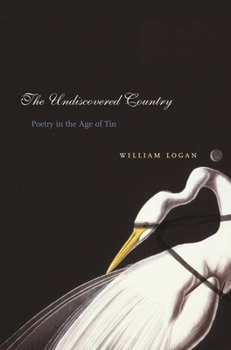The Undiscovered Country: Poetry in the Age of Tin
Select Format
Select Condition 
Book Overview
William Logan has been called both the "preeminent poet-critic of his generation" and the "most hated man in American poetry." For more than a quarter century, in the keen-witted and bare-knuckled reviews that have graced the New York Times Book Review , the Times Literary Supplement (London), and other journals, William Logan has delivered razor-sharp assessments of poets present and past. Logan, whom James Wolcott of Vanity Fair has praised as being "the best poetry critic in America," vividly assays the most memorable and most damning features of a poet's work. While his occasionally harsh judgments have raised some eyebrows and caused their share of controversy (a number of poets have offered to do him bodily harm), his readings offer the fresh and provocative perspectives of a passionate and uncompromising critic, unafraid to separate the tin from the gold. The longer essays in The Undiscovered Country explore a variety of poets who have shaped and shadowed contemporary verse, measuring the critical and textual traditions of Shakespeare's sonnets, Whitman's use of the American vernacular, the mystery of Marianne Moore, and Milton's invention of personality, as well as offering a thorough reconsideration of Robert Lowell and a groundbreaking analysis of Sylvia Plath's relationship to her father. Logan's unsparing "verse chronicles" present a survey of the successes and failures of contemporary verse. Neither a poet's tepid use of language nor lackadaisical ideas nor indulgence in grotesque sentimentality escapes this critic's eye. While railing against the blandness of much of today's poetry (and the critics who trumpet mediocre work), Logan also celebrates Paul Muldoon's high comedy, Anne Carson's quirky originality, Seamus Heaney's backward glances, Czeslaw Milosz's indictment of Polish poetry, and much more. Praise for Logan's previous works: Desperate Measures (2002)"When it comes to separating the serious from the fraudulent, the ambitious from the complacent, Logan has consistently shown us what is wheat and what is chaff.... The criticism we remember is neither savage nor mandarin.... There is no one in his generation more likely to write it than William Logan."--Adam Kirsch, Oxford American Reputations of the Tongue (1999)"Is there today a more stringent, caring reader of American poetry than William Logan? Reputations of the Tongue may, at moments, read harshly. But this edge is one of deeply considered and concerned authority. A poet-critic engages closely with his masters, with his peers, with those whom he regards as falling short. This collection is an adventure of sensibility."--George Steiner "William Logan's critical bedevilments-as well as his celebrations-are indispensable."--Bill Marx, Boston Globe All the Rage (1998)"William Logan's reviews are malpractice suits."--Dennis O'Driscoll, Verse "William Logan is the best practical critic around."--Christian Wiman, Poetry
Format:Hardcover
Language:English
ISBN:0231136382
ISBN13:9780231136389
Release Date:October 2005
Publisher:Columbia University Press
Length:400 Pages
Weight:1.55 lbs.
Dimensions:1.2" x 6.4" x 9.2"
Grade Range:Postsecondary and higher
Customer Reviews
1 rating
Just what contemporary poetry (and poetry readers) need
Published by Thriftbooks.com User , 15 years ago
Poetry is the only art form in America that I can think of that no longer has a bracing tradition of real criticism. Novels, plays, films, operas . . . we expect critics to note honestly whatever flaws and failures they see in specific works. Critical reviews often hurt box offices and egos, but without them an art atrophies. William Logan is a thoughtful, well read, and perceptive critic known for devastating and acerbic reviews, not unmixed with praise, and this collection shows why. He is not afraid to declare that the emperor has no clothes, even when reviewing demigods like Rita Dove ("...once a poet of modest but real talent . .[now given to] self-serve opportunism") and John Ashbery (who "has less matter behind his poems than anyone but a devout dadaist"). Logan is also honest and astute on poetry in general, and his long essays are well worth careful reading. Even when Logan shocks and challenges our own sensibilities (for me, by his remarks on the truly great Richard Wilbur), his criticisms are always rooted in an intelligent reading of the poems. To see if Logan's reviews are memorable, startling, and true for you, you can sample them at the web site of The New Criterion, but you might as well get this book now and dip into it now and again as a tonic against the hushed reverence that too often greets bland, lazy or meretricious poetry.





